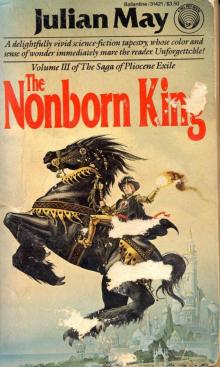- Home
- Julian May
Jack the Bodiless (Galactic Milieu Trilogy) Page 3
Jack the Bodiless (Galactic Milieu Trilogy) Read online
Page 3
The small boy was prodding and thrusting now at his mother’s mental shield, as a frustrated kitten scratches at a closed door. But there was no easy way through the maternal barricade; nature, compassionate of metaphysically operant parents, had rendered most of them proof against the onslaughts of their loving offspring.
“But why should Vic be made dead? Open to me, Mama, so I can understand better! I want to understand. Being dead is bad, isn’t it? How can it be good for Vic?”
“Dear, stop poking at me. How many times must I tell you to respect the integrity of other minds? And you must call him Granduncle Victor, not Vic. Politesse, dear, always!… When a person is very sick and unable to get well, it’s usually better for him to die and go to heaven rather than live on and suffer.”
Rogi uttered a short, explosive laugh. “Heaven! That’s rich.”
Teresa said calmly to the child, “Uncle Rogi is being ironic, Marc. Do you remember what irony is?”
“Yes, Mama. But I’d rather discuss death with you now, please.”
“There isn’t much time, but I’ll do my best, dear.”
Rogi had slowed the car as they drove through the central district of Berlin. The town had undergone great change since the last time he had been here, and now seemed gussied up and gentrified almost beyond recognition. The older buildings that were worth rehabilitating had been expertly restored and framed in plantings, and the new structures looked as though they had stood there from time immemorial, mellowing gracefully. There were small parks at every other block, quaint wrought-iron streetlamps already glowing against the early dusk, even though it was still two hours until sunset, and not a trace of shabbiness was anywhere to be seen. Even in the pouring rain the old cottages and frame apartments of the core residential area seemed to glow in their coats of fresh paint, many done in classic New England white with dark shutters, while others sported the cheerful ice cream colors traditional to southern Quebec.
Teresa continued in her attempt to explain mortality to the child. The tiny head with its thick mass of black ringlets had lowered as she spoke, apparently in obedient concentration. But all at once Rogi felt Marc renewing his quest for more interesting data, drilling into his own all-too-vulnerable cortex. Rogi exerted all of his adult coercion to fend off the infantile probing, addressing the boy with considerable precision on the intimate mode so that Teresa would have no hint of what he said:
Stop that digging you snoopy little foutriquet! Dammitall I’ll tell you if you stop pestering me! Vic is a bad man or at least he was bad before he got sick the baddest man that I ever knew and the sooner he’s dead the better off for all of us now is THAT plain enough for you?
Yes Uncle Rogi.
You’ll find out pretty soon what this Good Friday thing the family does with Vic every year is all about just keep QUIET and watch and listen and it’ll sort itself out. Afterward if you still have questions ask Grandpère Denis.
I—I don’t want to. I don’t like Grandpère. I’ll ask you. On the way back home. Will that be all right?
I suppose so. Now let me alone while I try to find this place. I haven’t been here in twenty-four years. Damn everything looks different up here! I guess I’ll have to turn on the computer.
“—and so the elements of our bodies that were formed ages and ages ago in the hearts of giant exploding stars, elements that we only borrowed for a little while, must be returned to the Galaxy for reuse,” Teresa was saying. “But even if our bodies die, our minds will live on in the Mind of the universe and be happy with God and all our friends and loved ones in eternal light. That’s what heaven is.”
“Will I die?” Marc asked her.
She grasped his tiny hands and kissed the top of his curly head. “Not for a long, long time. You have—you have a very special body to go along with your special mind.”
“Will you die? And Uncle Rogi?”
“Your Uncle Rogi has the same kind of special body that you have. He won’t die for a long time, either, and neither will Papa. I don’t have the same kind of body you all have, but if I get old or sick I’ll have myself regenerated so that I can stay with you. Do you remember what regeneration means?”
“Like Grandmère. In the regen-tank.”
“Exactly. When I get old I’ll go to a place that fixes me, just like Grandmère Lucille did, and I’ll be made young and strong again. She’ll be coming back to us very soon now. You’ll hardly recognize her. She’ll look as young as Aunt Cat.”
The car’s guidance system, having digested the code designation for the Victor Remillard estate on Upper Hillside Drive that Rogi called up, now switched on the vehicle’s autopilot. Rogi sighed and sat back in his seat while the car drove itself, using satellite reference points. In his reactionary heart of hearts, Rogi considered such refinements obscene, even worse than the now obsolete computerized highway speed-strips. They took all the fun out of driving. A man might as well take the bus! Or one of those bloody flying eggs that wafted around on preset flight paths set up by Air Traffic Control. Up until now, Rogi had refused even to consider learning to fly. But he was weakening. One had to move with the times—even these days, when the damned times seemed almost to zip along at the square of the speed of light.
The dashboard chimed and a robot voice spoke. “You will arrive at your destination in approximately three minutes. Prepare to resume manual control of the vehicle.” Rogi mumbled under his breath.
Marc asked his mother: Will we meet Papa and Uncle Philip and the others at Granduncle Victor’s house?
Yes. They’re all flying in.
The car had turned off Hillside Drive, following a narrow lane shaded by massive white pines and hemlocks. This manicured imitation of the primeval forest of New England opened at length into an expanse of lawn, sere with winter, and a magnificent vista of the Androscoggin River beyond. Parked near the house were five egg-shaped rhocraft—three Wulf-Mercedeses, a Mitsubishi, and a sporty green De Havilland Kestrel belonging to Severin Remillard. Paul’s scarlet Maserati was nowhere in evidence.
The house from which Victor had directed his commercial empire prior to the Great Intervention was fully as ugly as Rogi had remembered it: a looming pseudobaronial pile of brick, stucco, and false timbering, built in the 1930s for some satrap of the extinct paper mills. It had leaded glass windows, pointed gables, and a slate roof that gleamed oily in the rain. Rambling decayed extensions with fanciful cupolas mounted upon them had once been stables, garages, and servants’ quarters. Inside the main building were ten huge bedrooms, an oak-paneled library, a pretentious drawing room with an attached conservatory (the latter devoid of vegetation), a vast echoing ballroom, drafty hallways paved in marble, a modern kitchen and formal dining room that would have done credit to a small hotel, an empty indoor swimming pool, and a superlative state-of-the-art security system.
Victor Remillard had lived in this house since 2009, from the time of Remco Industries’ first great prosperity. With him were his younger twin brothers Louis and Leon, and his widowed sister Yvonne Fortier, all of whom he had rendered nonoperant in early childhood, turning them into his creatures. In 2013, when Victor’s criminal schemes were thwarted and he was reduced to a sense-deprived, helpless vegetable, the house became his place of exile. Louis, Leon, and Yvonne were promised immunity from prosecution by Denis and his politically influential friends provided they lived quietly in the old place, caring for Victor, supervising the small staff of domestics and nursing attendants, and staying out of the public eye.
Beginning in 2016, when his youngest son Paul was two years old, Denis Remillard and his wife Lucille Cartier and their seven powerfully operant children had come once each year, on Good Friday, to visit Victor. Denis explained to Yvonne, Louis, and Leon that he and his family were praying for Victor’s spiritual recovery.
Yvonne, Louis, and Leon never really understood what Denis meant by that; but they were grateful that they had escaped federal prison after aiding and abetting Victor in h
is crimes, and they willingly performed their assigned duties according to Denis’s instructions. Since they were virtual “normals,” they did not take part in the annual metaconcerted prayer ritual except to see to the needs of the operant visitors, who eventually came to include the spouses of Denis and Lucille’s adult children. Without Denis’s knowledge, Yvonne, Louis, and Leon themselves prayed every day of their lives that Victor Remillard would never awaken from his mysterious coma to reassume his domination over them. In point of fact, the trio prayed that Victor Remillard would die.
And finally, this year, it looked as though their petition might be granted.
Aurelie Dalembert stood at the casement windows of the library, looking out at the rain and sipping sherry. In spite of the roaring fire in the big fireplace, the room was chilly. Cecilia, Maeve, and Cheri sat in uncomfortable damask chairs as close to the hearth as they could get, fortifying themselves with hot tea.
“Any sign of the Prima Donna yet?” Maeve O’Neill asked sharply.
“No,” Aurelie replied. “Rogi’s bringing her and Marc. In a car.”
Cheri Losier-Drake, the youngest of the Remillard spouses at twenty-three, suppressed a tendency to shiver and reached for the silver teapot. “Every year this damned prayer vigil gets weirder. My nerves are a wreck. If only I could have a drink! Cele, you’re a doctor. Surely a single brandy couldn’t hurt.”
Cecilia Ashe gently laid a hand on her sister-in-law’s arm. A surge of calming redaction flowed from her brain to that of the other woman. “You know we mustn’t … Did that zap help a little?”
Cheri sighed. “Must have. Parni gave a happy kick.”
“It’ll all be over soon.” Aurelie’s voice was soothing.
“Can’t be soon enough,” snapped Maeve. She downed the last of her tea in a gulp, plunked the fine china cup and saucer down on the table with a rattling crash, and went to get another birch log from the cradle.
“I find the notion of an annual prayer ritual fascinating,” Cecilia said. “It’s touching—this concern for the family black sheep.”
“It’s easy to tell that it’s your first go-around,” Maeve said, tossing the log onto the blaze. A shower of sparks fled up the chimney. “I don’t know how much Maury told you about it, but we don’t actually pray, you know. Denis links all of our minds in a coercive metaconcert, and he does the praying. Or whatever. It’s Sevvy’s opinion that the whole thing is nothing more than a colossal guilt compensation on the part of Denis. Because he’s refused to pull the plug on Vic for all these years.”
Cecilia, who had married the widowed Maurice Remillard seven months earlier, assumed a professionally bland expression. “That might be one explanation. But there are others.”
“I think we’re coercing Vic to die,” Cheri said tersely. “And a consummation devoutly to be wished!”
“Amen,” said Maeve. She had thrown still another piece of wood on the conflagration and now dusted her hands and plopped back into her chair. “And if Paul’s right, and the infamous invalid is finally sinking, this might be the last year we’ll have to put up with Denis’s obsession.”
From the window, Aurelie said, “I see car lights. It’s Rogi and Teresa. And I’ve farspoken Paul. He and Denis will be here soon. The express Vee-route from Baltimore to Boston was OS and they lost time in a holding pattern. It’s a scandal, the way the traffic jams keep getting worse and worse.” She came to the fire and poured herself a cup of tea before sitting down with the others.
Cecilia said, “As a neurosurgeon, I find the whole matter of Victor Remillard’s mysterious coma fascinating. Is it true that his body has remained in perfect condition up until just recently?”
“He’s got the immortality gene complex like all the rest of these lucky sods,” Maeve said, with a bitter laugh. “Thank God the regen-tank therapy is perfected at last. Can you imagine how poor old Lucille must have felt? Turning into a decrepit old crone of seventy-two in spite of the best that cosmetic surgery could do, while her husband, who’s only a year older, still looks like a graduate student!”
“This will be the first Good Friday that Lucille has missed,” Cheri said.
“Probably planned it,” Maeve decided. “Nine months in the tank, then—tah-dah!—reborn, young and gorgeous.” She patted her thickening midsection. “It’s a crock that we still have to do babies the old-fashioned way. Look at us! Aside from Aurelie and Anne the virgin-martyr, we’re a bloody maternity ward. That’s all these dynastic Remillards seem to want out of us women: babies. Sometimes Sevvy seems positively irrational on the subject! I wonder if that’s why Jenny and Galya divorced him—”
“Teresa’s nearly due, isn’t she?” Aurelie remarked, changing the subject abruptly. “And Cat has only another month to go.”
“No, seriously,” Maeve persisted to Cecilia. “They’re planning to use artificial gestation to help populate some of the ethnic planets. Why not make it a general thing? I don’t mind being pregnant twice, but I’ll be damned if I’ll go through it again and again just to help fill the Human Polity with superior Remillard minds. But if we could pop the fertilized eggs into incubators—”
“We’ve had the technical capability for a long time,” Cecilia admitted, “and it is useful under certain circumstances. But it’s far better for the baby to grow inside its mother naturally. There are both physical and psychological factors involved. That’s why the Reproductive Statutes restrict artificial gestation so drastically.”
“What do the Simbiari Proctors know about it?” Maeve flared. “Damned egg-laying salamandroids! They don’t risk their lives having babies.” She sprang to her feet and strode over to the window. The car had pulled up to the porte cochère at the entrance to the mansion, and the obsequious Louis and Leon were hurrying to greet the arrivals.
“This pregnancy of yours is going much better than the last, Maeve, dear.” Aurelie tried to be consoling. “If you can just restrain your contraredactive tendencies—”
“—and avoid stress,” Maeve finished in an arch tone. “You can talk. Six kids already, and ready to keep it up till your ovaries pack it in. You drop babies as easily as an Indian squaw.”
Cheri said, wearily, “Try to calm down, Maeve. Give the rest of us a break.”
The Irishwoman said, “Oh, I’ll simmer down soon enough. Just as soon as we finish with this ghoulish wake for the living dead!” She stared out at the rain-swept sky. “If my feeble farsight’s not mistaken, that’s Paul’s egg coming now. Shall we go find our husbands and get this damned thing over with?”
Paul used his creativity to shield them from the rain as he and his father hurried from the egg to the house. Once Denis stumbled, and would have gone to his knees if Paul hadn’t seized his arm. “Papa, you’re still too weak to be out of the hospital. This was a mistake.”
Denis shook his head stubbornly. If anything, he looked even younger than his twenty-six-year-old son, who was nearly 30 cents taller than his father and sported a debonair mustache to enhance his image as a rising planetary statesman. Both men were dressed in sober suits and topcoats, and water from the sodden lawn threatened their highly polished shoes. Lucille had always insisted that the family dress in a semiformal fashion for the Good Friday ritual; and even in her absence they had automatically complied.
“I’m quite all right,” Denis insisted. “You know very well I was scheduled to leave Johns Hopkins next week. There’s nothing whatsoever wrong with me physically. Tucker Barnes was probably right when he diagnosed me as suffering from exhaustion and acute depression aggravated by Lucille’s absence.”
“All the more reason for us to postpone Good Friday.”
“No. That’s unthinkable, especially under the circumstances.”
They reached the porte cochère, and Paul canceled the metapsychic umbrella. The entry hall was brightly lit, and Louis and Leon hastened to open the front door and relieve Paul and Denis of their coats. The twins were sixty-two years old, stocky and balding and hollo
w-eyed, for all that they possessed the precious self-rejuvenating heritage. Unfortunately, it tended to express itself differently in different individuals, and the complex interaction of the thousands of genes involved was still poorly understood. Aunt Yvonne, who was a year older than the twins, was still pallidly youthful; but these two poor devils would always look middle-aged, like Uncle Rogi. Paul masked his disesteem as he greeted his uncles with cool formality. Would he retain his vitality and good looks as the years passed? Denis had, but he was a slightly built blond man, while Paul was robust and dark, as Rogi had been in his youth.
And Victor.
“How is he?” Denis asked.
“The nurse had to adjust the machine again,” Louis said.
“The rate of hemoglobin synthesis continues to decrease,” Leon added. “Heartbeat and respiration are normal, he assimilates nourishment and excretes, skin and muscular tone are nearly normal, and the EEG is as usual.”
“Nevertheless,” Louis finished, his voice completely neutral, “unless therapy is started soon to relieve the anemia, he’ll eventually die.”
Denis was already heading for the red-carpeted central staircase. “Paul, get the others together and bring them up at once.”
“Papa! Wait …”
Denis halted and turned around, one hand on the banister.
Paul took a breath, sealed off his inner thoughts with as much strength as he could muster, and readied his coercion. “Papa, I’ve thought the matter over all throughout our flight from Baltimore. I won’t let little Marc participate in the metaconcert. We don’t know enough about the way mind-linkage affects the participants.”
Denis’s face wore a gentle smile. He did not meet his son’s eyes. “Victor is failing, Paul. We may not have another chance, and we’re lacking your mother’s input this year. I assure you that the program I use is entirely benign. And Marc’s mind is more powerful than that of many adults. Far stronger than those of the wives and Brett.”

 The Many-Coloured Land
The Many-Coloured Land Conqueror's Moon
Conqueror's Moon The Sagittarius Whorl
The Sagittarius Whorl The Nonborn King
The Nonborn King Sky Trillium
Sky Trillium The Sagittarius Whorl: Book Three of the Rampart Worlds Trilogy
The Sagittarius Whorl: Book Three of the Rampart Worlds Trilogy Intervention
Intervention Orion Arm
Orion Arm Diamond Mask
Diamond Mask The Golden Torc
The Golden Torc The Noborn King
The Noborn King Magnificat
Magnificat Jack the Bodiless
Jack the Bodiless Perseus Spur
Perseus Spur The Adversary
The Adversary Sorcerer's Moon
Sorcerer's Moon Sagittarius Whorl
Sagittarius Whorl The Intervention (Omnibus)
The Intervention (Omnibus) Magnificat (Galactic Milieu Trilogy)
Magnificat (Galactic Milieu Trilogy) Jack the Bodiless (Galactic Milieu Trilogy)
Jack the Bodiless (Galactic Milieu Trilogy) Diamond Mask (Galactic Milieu Trilogy)
Diamond Mask (Galactic Milieu Trilogy) The Many-Coloured Land sope-1
The Many-Coloured Land sope-1